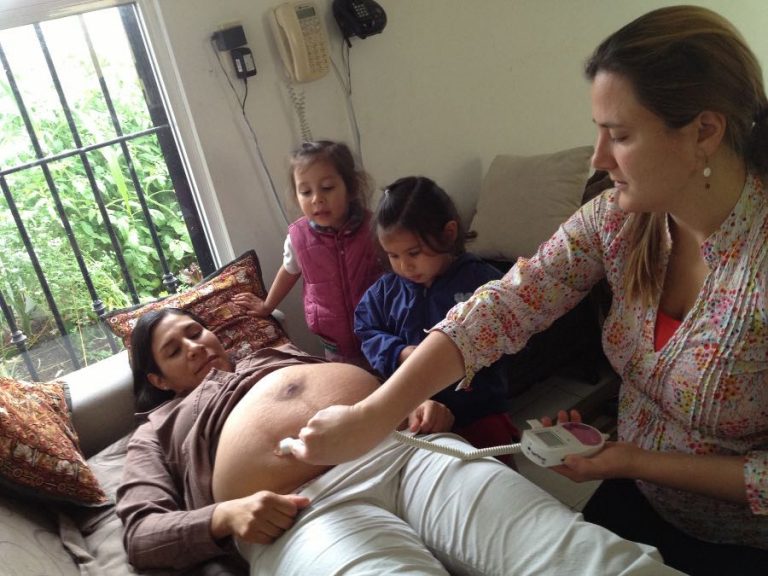With simple but resounding words, Frances Day-Stirk, President of the International Confederation of Midwives, reminded 4,200 people gathered in Toronto that midwives are the engine of creativity and care that can deliver for mothers, babies, and families around the world.
Always aiming to best serve mothers, babies, and their communities, midwives’ human-centered approach to delivering care drives them to find ever-new ways to improve, adjust, and improvise when needed. Innovation is fundamental to midwifery. Enabling that ingenuity is fundamental to how Johnson & Johnson supports and champions midwives and others on the front lines of care as they improve the trajectory of health for humanity.
This week marked the launch of the GenH Challenge, a social venture competition designed to accelerate everyday solutions to health challenges. We were honored to launch the GenH Challenge at the world’s largest gathering of midwives, the International Confederation of Midwives (ICM) Triennial Congress. But of course, championing innovation on the front lines means not only fueling innovation within midwifery – it also means bringing midwives to the table with health innovators and entrepreneurs as they design new approaches to health care.
Samara Ferrara, a participant in Johnson & Johnson and ICM’s Young Midwife Leader program, as well as an Aspen Ideas Festival “Spotlight Health Scholar,” will have the opportunity this week of being part of both sides of this conversation. Samara has been a practicing midwife for eight years, and plays a leading role in redefining what it means to be a modern-day midwife in Mexico. As ICM wrapped, and in anticipation of Spotlight Health, we spoke with Samara about this unique intersection.
Zack Langway (ZL) What does leadership mean to you, and what would you say is your leadership style?
Samara Ferrara (SF): A leader is someone who leads by example – someone who inspires and touches other people to act, do, or think in new ways. I try to lead by example by bringing the community and midwives together, and by sharing information so people can better understand what midwives do, not just in Mexico, but around the world. I want people to understand that it’s not enough to survive birth, and that the experience of the family during the birth has a large impact on that human being for the rest of their life. I also share moments and stories from births I witness with inclusive language so that everyone, whether they currently understand midwifery or not, can see themselves or someone they know in the story.
ZL: How do you use your role as a midwifery leader to identify community needs, and come up with innovative ways to solve them?
SF: I create opportunities for dialogue between midwives and other decision-makers in my region. For example, I recently organized a regional conference for midwives, government representatives, medical schools including nurses and doctors, as well as non-profit organizations, to bring all sorts of different perspectives together on the role of midwifery in improving the health of our women and children. The definition of what it means to be a midwife is still unclear in Mexico, and because of the conference, I am now engaged in a discussion with government representatives about midwifery law and what it will take to open a midwifery school.
Creating these links with the community and decision makers is incredibly important to establish that midwifery is an option for quality care. Whether through a conference, or smaller classes, I try to continuously offer educational opportunities for my fellow midwives to reinforce the importance of continuous education and participating in advocacy efforts. It’s not a new profession, but we are pioneering new areas that have not been defined in the community and country.
ZL: What are some of the little, everyday things that have made a big difference in the community you serve?
SF: I’m working hard to give new meaning to what midwifery is nowadays, because there are many misunderstandings around what it means to be a midwife, like the planning and support we provide women and their families during, before, and after pregnancy. I’ve also started partnerships with a pediatrician and a gynecologist which have been very successful. People sometimes think that midwives and doctors are adversaries, but working together, we can offer families the best of both worlds and the clients can really have a choice in how they receive care. So, something as little as a partnership that builds new relationships can have a big difference for families and health.
ZL: As Frances emphasized, how can midwives be the pioneers developing new approaches and methods to provide the best possible care for mom and baby?
SF: We need to put women first. We can start by asking them directly what they need so innovations based on their ideas will be rooted in their needs as the “end user.” As midwives, we also need to push ourselves beyond our comfort zones. We need to expand our education beyond midwifery and learn new skills that can help us better advocate for our profession and demand change from our leaders. As midwives, we need to take on many different roles in our communities – care provider, counselor, leader, advocate, innovator – and we need to be prepared to do so with the highest level of quality.
I also want to encourage my fellow midwives to take part in competitions like the GenH Challenge because our ideas are the fastest roads to innovation in our countries. I definitely plan to regroup with my team back home, as well as the women of my community, to hear their voices and determine the best innovation we can submit to the GenH Challenge.
ZL: What is do you enjoy most about attending conferences like the ICM Triennial Congress and Aspen Ideas Festival?
SF: I look forward to connecting with new people and creating alliances on shared goals. I also love to learn about the latest innovative ideas and information out there and think through how that might apply to my work. We need innovation so we can change and create new possibilities in my community and my country.
 Blog by Zack Langway
Blog by Zack Langway
Zack Langway is the senior manager of experiential philanthropy in social innovation for Global Community Impact at Johnson & Johnson. Prior to joining Johnson & Johnson, Zack led the global development team at Fenton, the social change agency. He has served as a consultant and in-house digital strategist for organizations including the United Nations Foundation, Save the Children, and Bread for the World.
